Submitted:
27 December 2022
Posted:
05 January 2023
You are already at the latest version
Abstract
Keywords:
1. Introduction
2. Materials and Methods
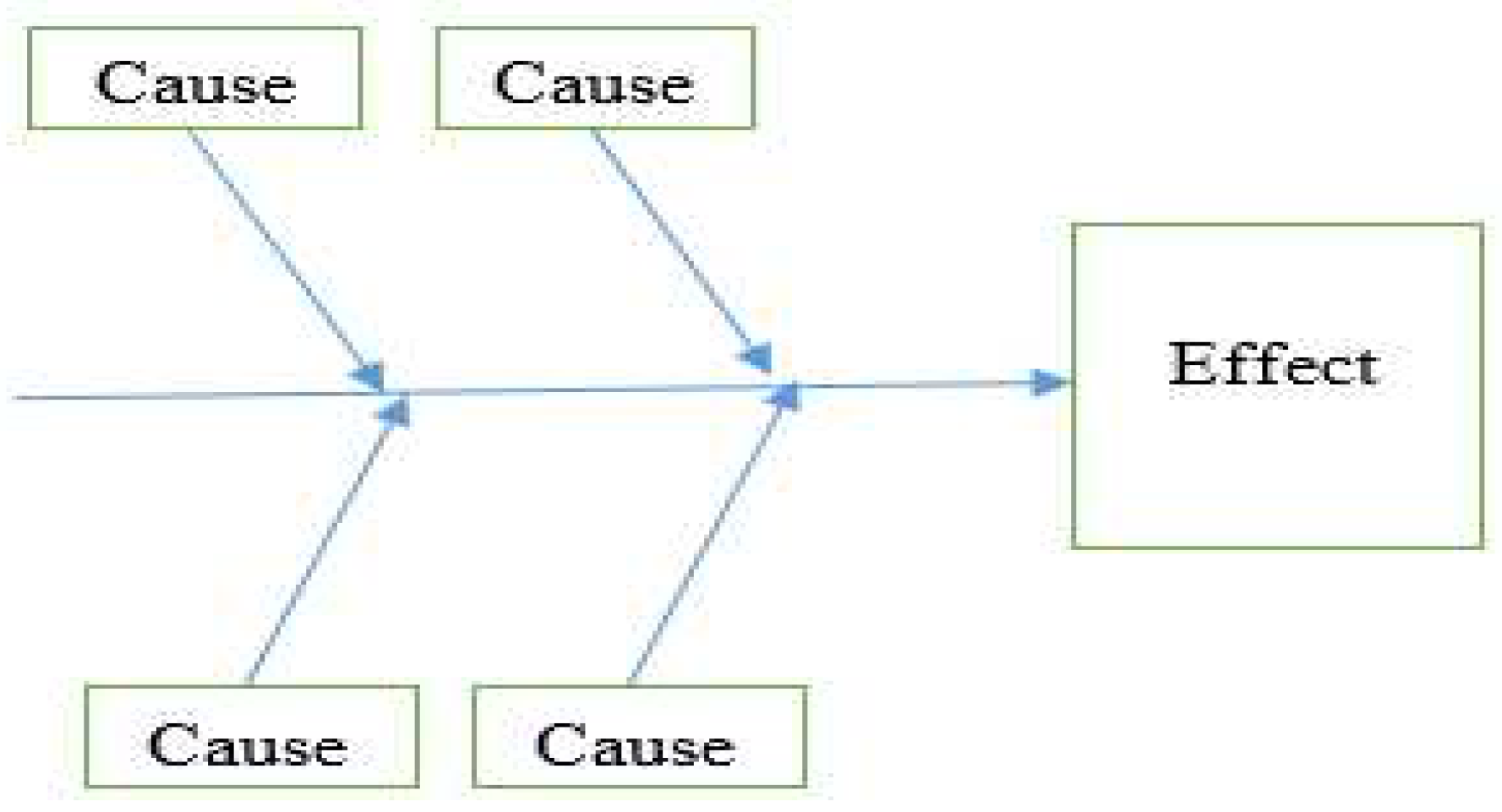
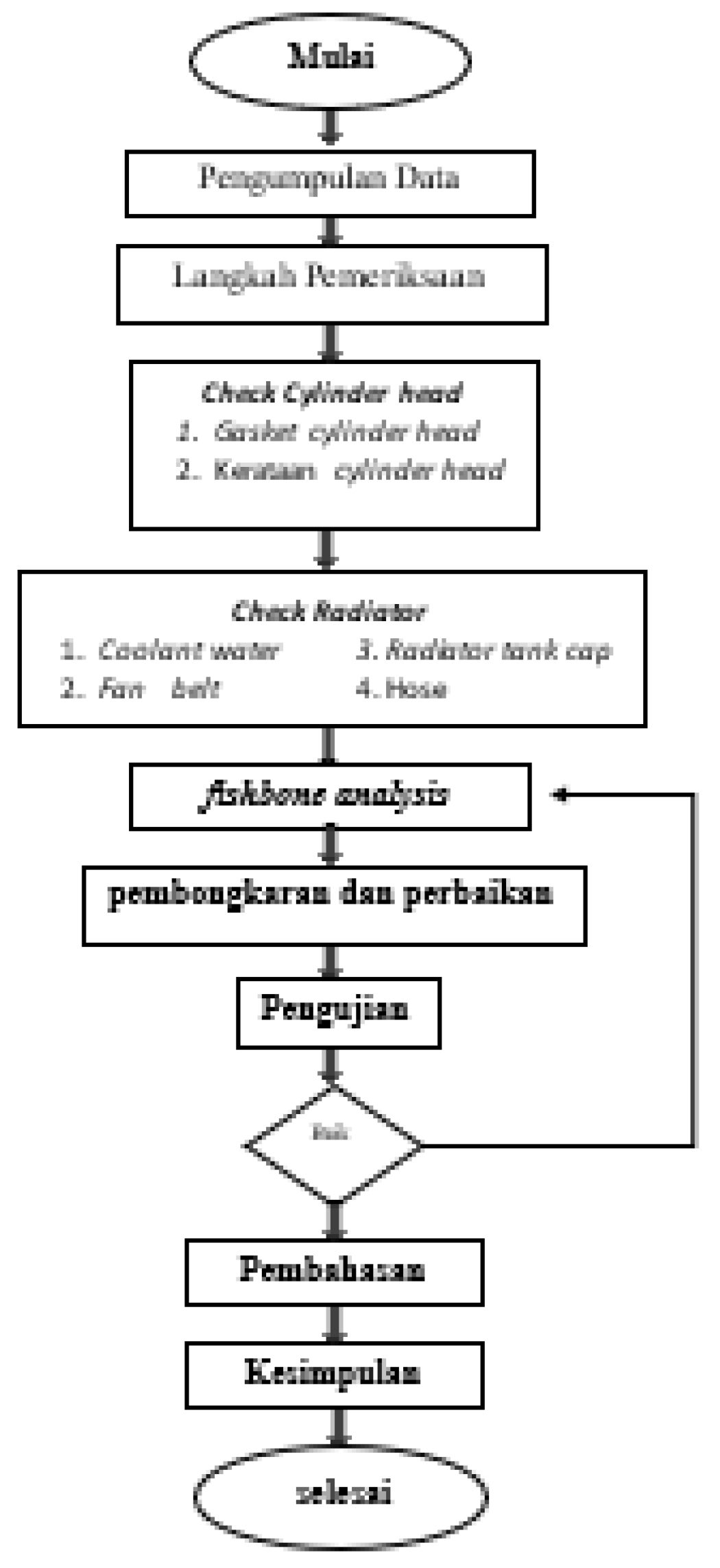
3. Results and Discussion
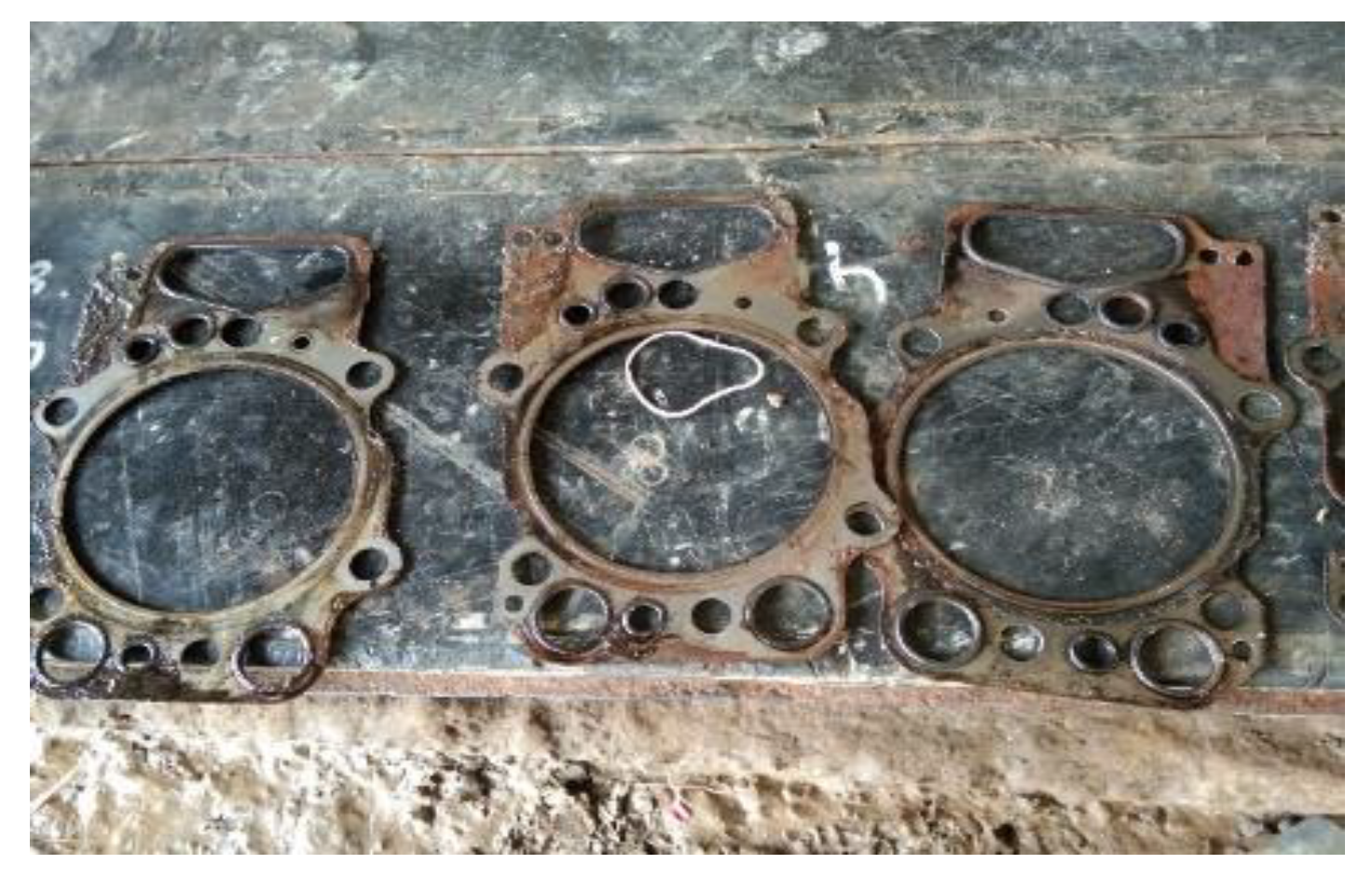
- a)
- Agreed on problems that occur with the engine, any problems that occur [there is an engine is the engine has overheated. So, the problem that is agreed upon or that is used as an effect or visually in fishbone such as a fish head is "engine overheat"
- b)
-
The second step is to identify the categories that become branches in each of the main causes, while the categories that become the main causes or causes are:Man, Material, Metodhe, Machine/Tools
- c)
- Step 3 is to find a potential cause by means of barriostroming
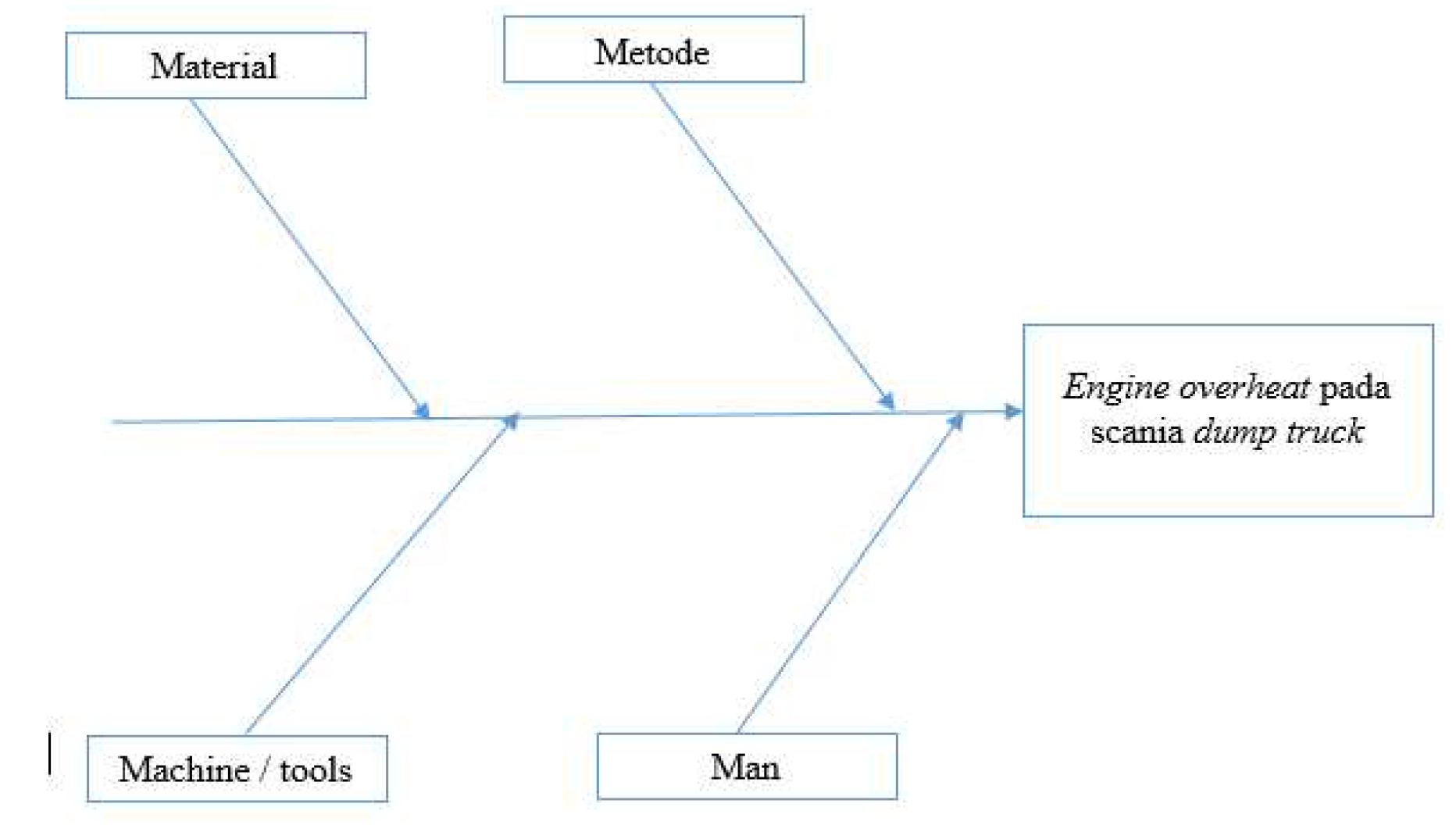
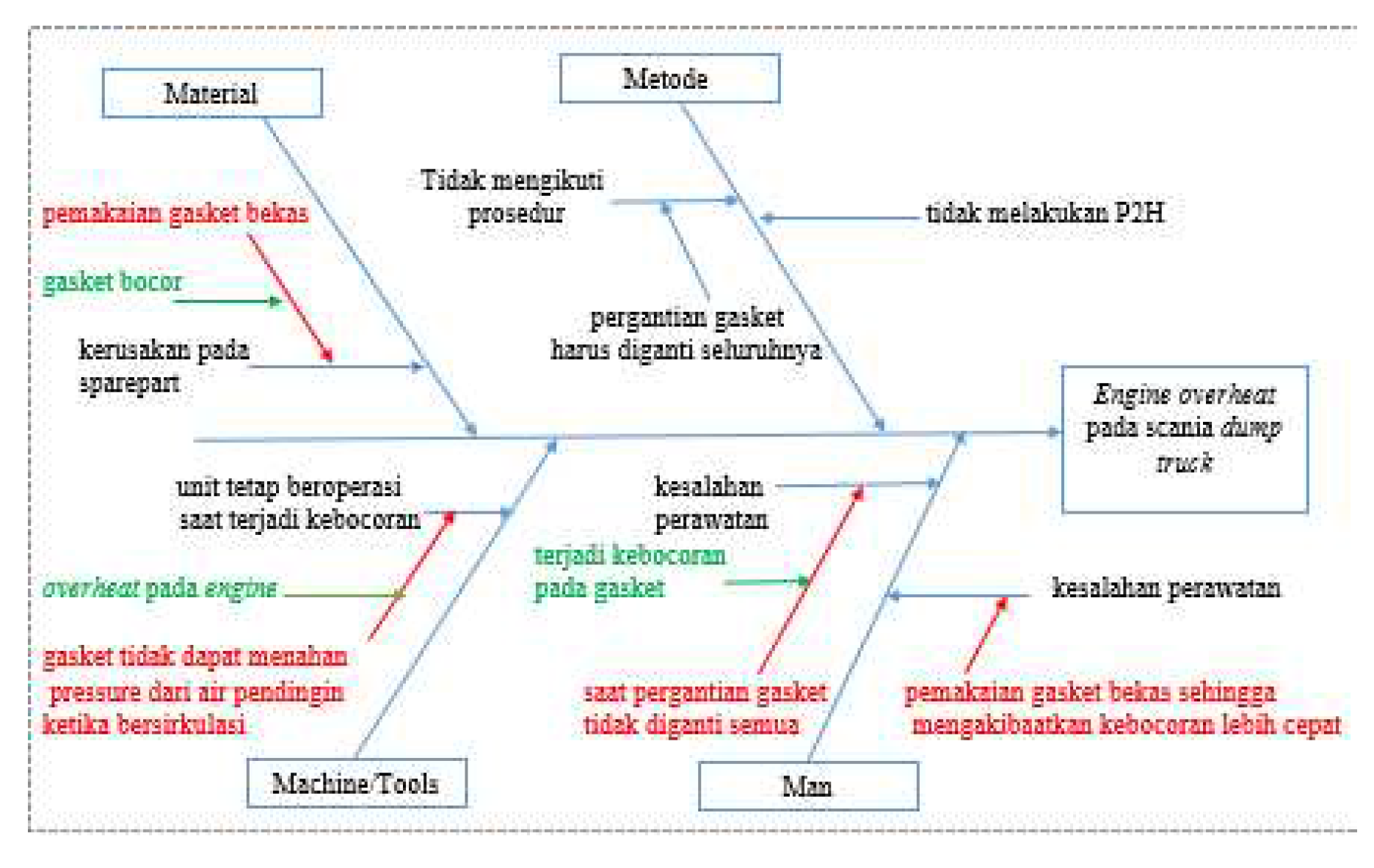
- c)
- Step 4 agree and examine the most likely causes After each category is filled in, look for the cause that is most likely to cause overheating of the Scania dump truck p380 engine
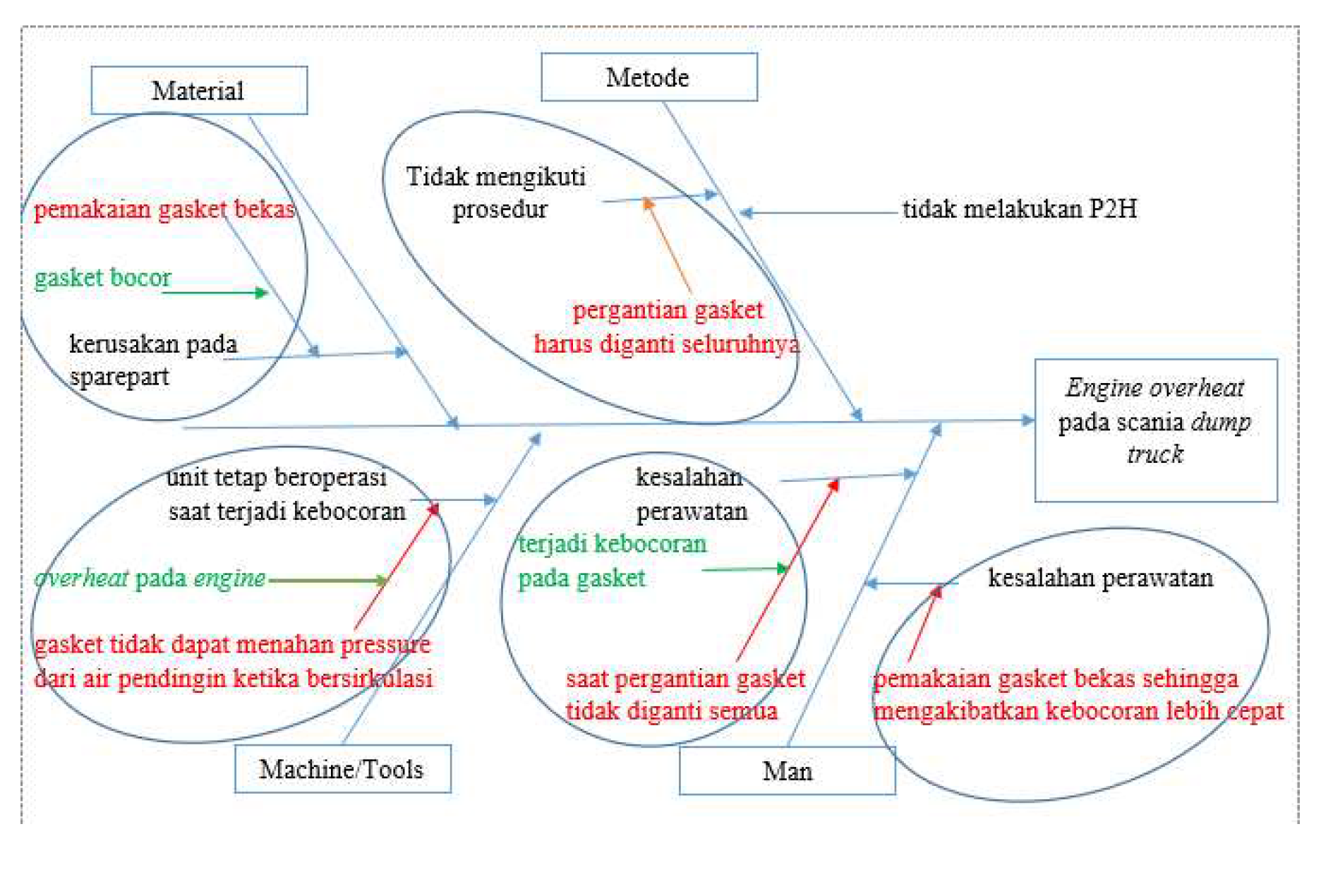
| Possible root cause | Discussion | Root cause |
|---|---|---|
| Manusia (Man) | ||
| Maintenance error | When changing the gasket, the mechanic did not replace all the gaskets, resulting in a leak in the used gasket | Yes |
| Maintenance error | The use of used gaskets in the engine results in faster damage to used gaskets | Yes |
| Machine/Tools | ||
| The unit remains operational in the event of a leak | Cooling water decreases quickly because the gasket cannot withstand the pressure from the cooling water when the cooling water circulates at the engine's ideal operating temperature. This causes the engine to overheat | Yes |
| Metodhe | ||
| Not doing P2H | In the morning briefing the operator who will operate the unit will carry out daily checks and checks first | No |
| Not following procedures | In company procedures, when changing the gasket, a complete replacement of the cylinder head gasket must be carried out | Yes |
| Material | ||
| Damage to spare parts | The use of used gaskets causes the gasket to be damaged more quickly | Yes |
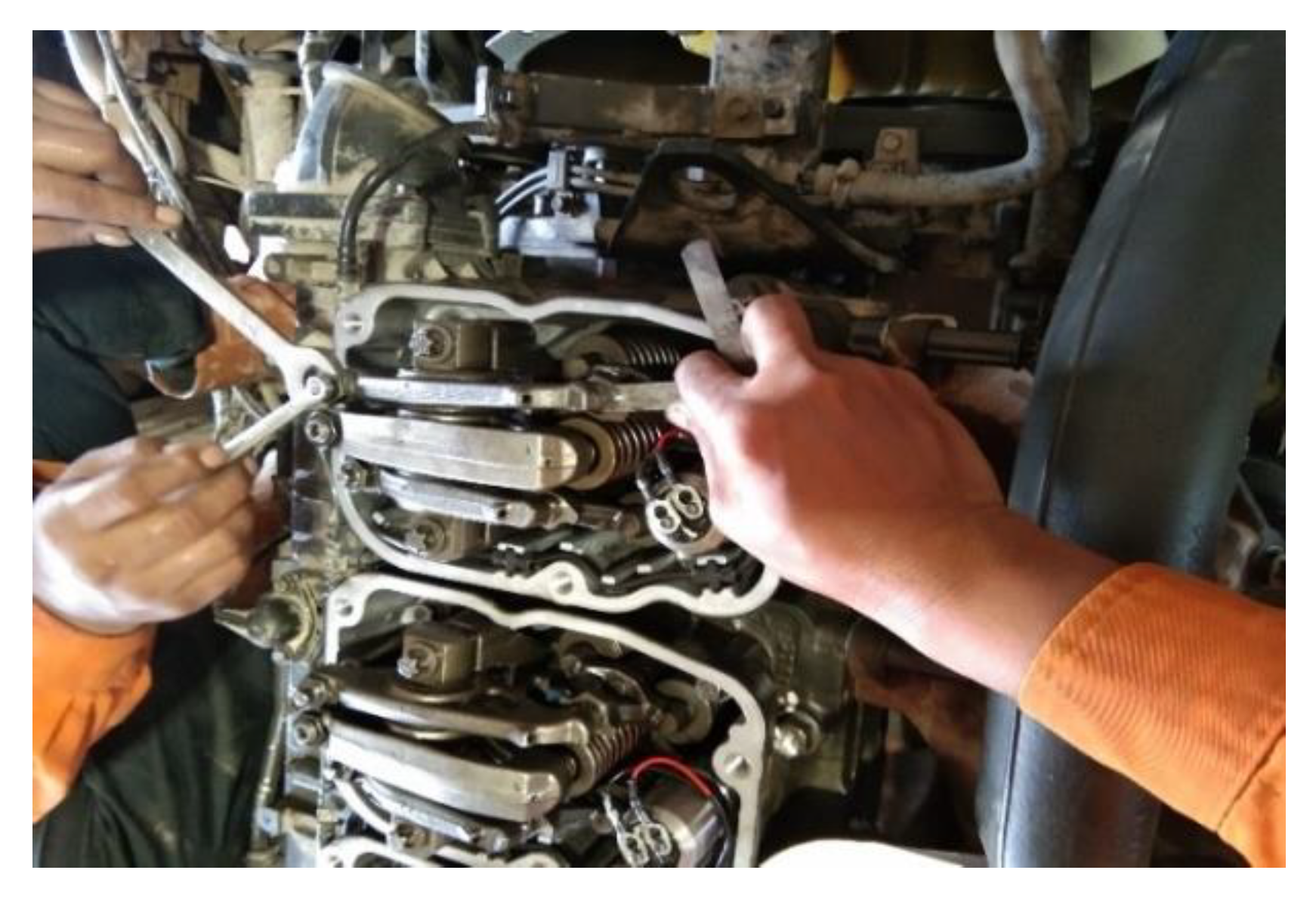
Conclusions
Acknowledgments
References
- Vandy Pramujaya, Dwi Agustina Kurniawati (2019). Analisis Penyebab Kegagalan Packer Machine Pada Bag Transfer System Dengan Menggunakan Metode Fault Tree Analysis (FTA), Failure Mode And Effect Analysis (FMEA), dan Fishbone Analysis. 125–132, 2019.
- Suryani, Faizah., (2018). Penerapan Metode Digram Sebab Akibat (Fishbone Diagram) Dan FMEA (Failure Mode And Effect) Dalam Menganalisa Resiko Kecelakaan Kerja Di PT. Pertamina Talisman Jambi Merang. 3(2), 64-69.
- Rooney, J. J, Heuvel, L.N, 2004. Root Cause Analysis for beginners, [pdf], (https://servicelink.pinnacol.com/pinnacol_docs/lp/ cdrom_web/safety/management/accident_investigat ion/Root_Cause.pdf, diakses 28 Mei 2016).
- Ghivaris, G. A., K. Soemadi, A. Desrianty. 2015. Usulan Perbaikan Kualitas Proses Produksi Rudder Tittler di PT. PINDAD Bandung menggunakan 86 FMEA dan FTA. Jurnal Teknik Industri Institut Teknologi Nasional (Itenas) Bandung. Vol. 3, No.4.
- Kusnadi, Eris. 2011.
- Purba, H. H. 2008. Diagram Fishbone dari Ishikawa. Available online: http://hardipurba.com/2008/09/25/diagram-fishbone-dari-ishikawa.html.
- Stamatis, D. H. 1995. Failure Mode and Effect Analysis: FMEA from Teory to Execution. Milwaukee: ASQC Quality Press.
- Sudrajat, Ating. 2011. Pedoman Praktis Manajemen Perawatan Mesin Industri. Bandung: PT. Refika Aditama.
- Herjanto, Eddy. 2007. Manajemen Operasi Edisi Ketiga . PT Gramedia WidiasaranaIndonesia: Jakarta.
- Rahardi, D. Fishbone Analysis. 29 November 2008. Available online: http://dickyrahardi.blockspot.com (accessed on 29 November 2008).
- Surakhmad, W. 1994. Pengantar Penelitian Ilmiah: Dasar, Metode, Dan Teknik. Tarsito.
- Purba, H. Jurnal : Diagram Fishbone dari Ishikawa. www.hardipurba.com. Diakses pada tanggal 4 Maret 2009.
- Purwono, H, dan Rasma, 2017, Analisa Engine Overheat Pada Unit Komatsu Bulldozer D155A-6, Prosiding Semnaste.
- Shop manual, KOMATSU engine D155A-6.
- Ammar, A. (2010),Reduction of Fuel Consumption in Gasoline Engines by Introducing HHO Gas into Intake Manifold,an Intrnational Journal of Hydrogen Energy 35 ,2010.
- Arif Setyo. (2012), Studi Eksperimental variasi tekanan Bahan Bakar Dan Sudut Pengapian Engine EFI Berahan Bakar Gasohol E20 terhadap Emisi Gas Buang. Politeknosains. Politama. Surakarta.
- Pulkrabek, W. W. 1997. Engineering Fundamentals of the Internal Combustion Engine. New Jersey: Penerbit Prentice Hall. [CrossRef]
- Artanto, H.; Nurdiyansyah, F. (2017). Penerapan SEO (Search Engine Optimization) Untuk Meningkatkan Penjualan Produk. Journal of Information Technology and Computer Science (JOINTECS), ISSN: 2541-6448, Vol. 1, No. 2, 2017, hlm 1-4. [CrossRef]
- Ankalkoti, P. (2017). Survey on Search Engine Optimization Tools & Techniques. Imperial Journal of Interdisciplinary Research, ISSN: 2454-1362, Vol. 3, Issue 5, 2017, hlm.
- Devanta Bayu Prasetyo, Fajar Patriayudha (2009), Pemakaian Gasohol sebagai Bahan Bakar Pada Kendaraan Bermotor, Jurusan Teknik Kimia, Universitas Diponegoro, Semarang.
- Dharma, U. S. Nugroho, dan M. Fatkurahman, 2018. Analisa Kinerja Mesin Diesel Berbahan Bakar Campuran Solar Dan Minyak Plastik. Jurusan Teknik Mesin. Universitas Muhammadiyah Metro. Lampung. [CrossRef]
- Rasyiid, M. A. M. 2015. Karakterisasi Unjuk Kerja Mesin Diesel Generator Set Sistem Dual Fuel Solar Dan Syngas Biomass Serbuk Kayu.
- Al malna, M. R. 2015. Karakterisasi Unjuk Kerja Mesin Diesel Generator Set Sistem Dual-Fuel Solar Dan Syngas Biomass Serbuk Kayu. Jurusan Teknik Mesin. Fakultas Teknologi Industri. Institut Teknologi Sepuluh Nopember. Surabaya.
- Brady, N,R,. 1996. Modern Diesel Technology. Prenyice. Hall. Inc.
- Dagel, F,J,. And Brady, N, R,. 1998. Diesel Engine and Fuel System Repair, Prentice-Hall, Inc.
- Asrifan, A., Vargheese, K. J., Syamsu, T., & Amir, M. (2020). ESP course design: the need analysis on tourism department in Indonesia vocational high schools. Journal of Advanced English Studies, 3(2), 69-77. [CrossRef]
- Tilome, A. A. , Andi Agustang, A. A., Jasruddin, J., Syukur, M., & ASRIFAN, A. (2020). Social Exchange of Political Elites in the Regional Leader Election of Gorontalo Province, Indonesia. Solid State Technology.
- Asrifan, A. (2020). Pandemic, Humanity and Education.
- Tang, S., Asrifan, A., Chen, Y., Haedar, H., & Agussalim, M. (2019). The humor story in teaching reading comprehension. Journal of advanced english studies, 2(2), 77-87. [CrossRef]
- Asrifan, A. (2021). Using cat and mouse game to improve student’s speaking ability at the eleventh grade of ma ympi rappang.
- Asrifan, A., & Ghofur, A. (2021). THE USE OF READING CIRCLES IN INCREASING STUDENTS SPEAKING ABILITY AT THE ELEVENTH GRADE SMK NEGERI 1 PANCARIJANG.
- Nadirah, N., Asrifan, A., Vargheese, K. J., & Haedar, H. (2020). Interactive multimedia in EFL classroom: a study of teaching reading comprehension at junior high school in Indonesia. Journal of advanced english studies, 3(2), 131-145. [CrossRef]
- Taslim, T., Asrifan, A., Chen, Y., & Nurdania, N. R. (2019). Correlation Between Student’s Vocabulary Mastery And Speaking Skill. Journal of Advanced English Studies, 2(2), 65-76. [CrossRef]
- Muthmainnah, A. R., Atmowardoyo, H., Salija, K., & Asrifan, A. (2020). Literary work as teaching materials: A study of students and lecturers needs analysis. Solid State Technology, 63(5), 394-407.
- Nurwanti, N., Asrifan, A., & Haedar, H. (2019). THE APPLICATION OF COOPERATIVE LEARNING: JIGSAW II TECHNIQUE IN IMPROVING STUDENTS’READING COMPREHENSION OF EXPOSITORY TEXT. Journal of Advanced English Studies, 2(1), 31-40. [CrossRef]
- uasa, K., Asrifan, A., & Chen, Y. (2017). Classroom talk in bilingual class interaction. Research in Pedagogy, 7(1), 106-121. [CrossRef]
- Asrifan, A. (2015). Analysis of English Students’ Learning Style in Bilingual Class. International Journal of Literature and Arts, 3(4), 34. [CrossRef]
- Asrifan, A. (2009). Using songs in teaching English language for the young learners. ParePare: unpublished.
- Asrifan, A., Nadira, N., & Haedar, H. (2018). IMPROVING STUDENTS’READING COMPREHENSION OF DESCRIPTIVE TEXT THROUGH COLLABORATIVE MURDER. Journal of Advanced English Studies, 1(2), 21-31. [CrossRef]
- Asrifan, A., & Ghofur, A. (2021). TALK, ACTION, SILENCE, INTERRUPTION AND THEIR IMPLICATIONS IN BUGINESE SOCIETY (SOPPENG REGENCY).
- Asrifan, A., Rinantanti, Y., Tang, S., & Nadirah, N. (2019). THE 3-DIMENSION PICTURES IN INCREASING THE STUDENTS ABILITY AND INTEREST TO WRITE DESCRIPTIVE COMPOSITION. JOURNAL OF ADVANCED ENGLISH STUDIES, 2(1), 19-30. [CrossRef]
- Asrifan, A. (2015). The use of pictures story in improving students’ ability to write narrative composition. International Journal of Language and Linguistics, 3(4), 244-251. [CrossRef]
- Asrifan, A., & Syahrir, L. (2021). Code Mixing and Code Switching in the Efl Classroom Interaction.
- Asrifan, A. (2016). The Effectiveness of Think-Pair-Share Technique in Improving Students’ Speaking Ability and Interest. English Literature and Language Review, 2(3), 24-35.
- Nagauleng, A. M., Asrifan, A., & Waris, A. M. (2021). Perceptions with Non-English Educational Background Competence in English Teaching. Al-Ishlah: Jurnal Pendidikan, 13(2), 1259-1268. [CrossRef]
- Asrifan, A., Abdullah, H., Yunus, M., & Patil, A. (2021). An Analysis of Code Mixing in the MOVIE “From London to Bali”. ENGLISH FRANCA: Academic Journal of English Language and Education, 5(2), 317-338.
- Octaberlina, L. R., & Asrifan, A. (2021). The Text-Based Character in Teaching Reading Comprehension At the Tenth Grade Students.
- Machmuddin, H., Agustang, A., & Asrifan, A. (2021). Improving The Quality of Primary Health Services in The Perspective of Participatory Governance.
- Yusuf, I., & Asrifan, A. (2020). Peningkatan Aktivitas Kolaborasi Pembelajaran Fisika Melalui Pendekatan Stem Dengan Purwarupa Pada Siswa Kelas Xi Ipa Sman 5 Yogyakarta:(Improving Collaboration of Physics Learning Activities through the STEM Approach). Uniqbu Journal of Exact Sciences, 1(3), 32-48.
- Asrifan, A., Ghofur, A., & Azizah, N. (2020). Cheating behavior in EFL classroom (a case study at elementary school in Sidenreng Rappang Regency). OKARA: Jurnal Bahasa dan Sastra, 14(2), 279-297. [CrossRef]
- Gunawan, G., & Asrifan, A. (2020). Penerapan Kerja Kelompok Kegiatan MGMP Guru Ekonomi dalam Menyusun RPP untuk Meningkatkan Kompetensi Pedagogik. Celebes Education Review, 2(1), 31-36. [CrossRef]
- Pacinongi, A., & Asrifan, A. (2020). Bimbingan Pengawas Berkelanjutan dalam Mewujudkan Pendidikan Karakter Bangsa dalam Kegiatan Belajar Mengajar Penjaskes. Celebes Education Review, 2(1), 1-7. [CrossRef]
- Asrifan, A. (2021). IMPROVING STUDENTS’SPEAKING ABILITY BY USING HAND DOLLS OF THE ELEVENTH GRADE STUDENTS OF MA YMPI RAPPANG.
- Asrifan, A. (2021). ISSUES IN TEFL “International Article Summary & Presentation”: Students’ Reactions to School Based Oral Assessment: Bridging the Gap in Malaysia.
- Asrifan, A., Muthmainnah, M., Al-Yakin, A., Sahabuddin, C., & Haedar, H. (2018). THE CAUSE-EFFECT TECHNIQUE IN TEACHING RECOUNT WRITING. JOURNAL OF ADVANCED ENGLISH STUDIES, 1(2), 63-72. [CrossRef]
- Asrifan, A., Vargheese, K. J., Hasnidar, H., Hermasyah, S., & Suleha, S. (2021). The Study of Lexical and Contextual Meaning on Lily Song By Alan Walker Feat K-391 & Emelie Hollow (Semantic Approach). Journal of Advanced English Studies, 4(1), 7-14.
- Octaberlina, L. R., & Asrifan, A. (2021). THE USE OF HUMOR STORY IN IMPROVING THE STUDENTS’READING COMPREHENSION.
- Asrifan, A. ONLINE METHOD AND MENTAL LEXICON IN CHILDREN LANGUAGE PROCESSING PSYCHOLINGUISTICS APPROACH. La Ogi: English Language Journal, 8(1).
- Octaberlina, L. R., & Asrifan, A. (2021). English for Specific Purposes (ESP).
- Asrifan, A. (2020). PENILAIAN BERBASIS ANDROID MENGGUNAKAN APLIKASI PLICKERS.
- Asrifan, A., Octaberlina, L. R., & Handayani, R. (2021). SEMANTIC ANALYSIS ON THE USE OF ENGLISH LANGUAGE SLOGAN.
- Putra, M. T. I., Maulina, M., Muthmainah, M., Asrifan, A., Apriani, E., Ejica, N. C. P., & Peroddin, A. D. D. (2021). Teaching Communicative Grammar: A Literature Review. CAPE COMORIN: An International Multidisciplinary Double-Blind Peer-reviewed Research Journal, 3(02), 63-68.
- Fakka, B., Asrifan, A., Syahrir, L., Hermansyah, S., & Amran, N. A. R. (2022). Correlation Between Self-Concept and Anxiety of Communicative Competence in English Foreign Language Learner. La Ogi: English Language Journal, 8(1), 25-34. [CrossRef]
- Asrifan, A., Jabu, B., Atmowardoyo, H., & Chen, Y. (2017). Analysis of Students’ Perceptions of Bilingual-Based Materials in English for Educational Technology in Indonesia. International Journal of English Linguistics, 7(6), 204-212. [CrossRef]
- Asrifan, A., & Raskova Octaberlina, L. (2021). An Item Analysis Of English Summative Test in EFL Classroom (A case study at Elementary School in Indonesia). ScienceOpen Preprints.
- Ahriani, A., Agustang, A., & Asrifan, A. (2021). Marginalisasi Budaya (Studi Pada Pranata Sosial Masyarakat Muslim Suku Kokoda Kota Sorong).
- Qisti, N., Nurwidah, A., Muslimin, I., & Asrifan, A. (2020). The effect of temperature and time drying toward organoleptic quality of the ducks bone meal. Solid State Technology, 63(6), 19652-19659.
- Agustang, A., Mutiara, I. A., & Asrifan, A. (2021). Genealogi Stigma Sosial Terhadap Pasien Covid 19.
- Asrifan, A. (2021). Aplikasi Dan Implikasi Berpikir Sistemik (Systemic Thinking) Dalam Kehidupan.
- Asrifan, A. (2021). Modul Perkuliahan RESEARCH ON ENGLISH LANGUAGE TEACHING.
- Asrifan, A., & Mohammed, M. G. (2021). The Perceptions on Bilingual-based Materials Approach in English for Educational Technology. Modern Perspectives in Language, Literature and Education Vol. 4, 28-38.
- Muthmainnah, M., Asrifan, A., Al Yakin, A., & Elngar, A. A. (2022). Satisfaction of Students toward Media and Technology Innovation Amidst COVID-19. Available at SSRN 4191538.
- Asrifan, A., & Raskova Octaberlina, L. (2021). The cooperative integrated reading and composition (CIRC) strategy in teaching reading comprehension teaching comprehension. ScienceOpen Preprints.
- Agustang, A., Mutiara, I. A., & Asrifan, A. (2021). Masalah Pendidikan di Indonesia.
- Agustang, A., Ariani, A. I., & Asrifan, A. (2021). Konstruksi Sosial Janda Tereksploitasi (Studi Kasus Di Kelurahan Tetebatu Kecamatan Pallangga Kabupaten Gowa).
- Asrifan, A., & Aeni, N. (2021). Book Review: I SPEAK FIVE LANGUAGES: FOSTERING PLURILINGUAL COMPETENCE THROUGH LANGUAGE AWARENESS By: Oliveira and Helena, Maria.
- Muthmainnah, M., Hasan, H., Asrifan, A., Heriyanto, H., & Elihami, E. (2022). Efektivitas Strategi Omaggio Terhadap Kemampuan Menyimak Cerita Fabel Terintegrasi Media Youtube. Edumaspul: Jurnal Pendidikan, 6(1), 863-874. [CrossRef]
- Agustang, A., & Asrifan, A. (2021). BAHAN MATA KULIAH MATA KULIAH PSYCHOLINGUISTICS.
- R Agus Marhendra, R., Syaharudddin, R., Utami, S., Puriani, R. A., Alamsyah Sahabuddin, R., Salijah, E., ... & Sam Hermansyah, F. (2022). Challenges of Social Sciences, Education, and Technology For Achieving Sustainable Development Goals (SDGS), Jilid II. Media Sains Indonesia.
- Asrifan, A. (2021). ADVANCED GRAMMAR “Adverbs and Adverb Clauses”.
- Asrifan, A. (2021). Book Review KONSTRUKSI GROUNDED TEORI Petunjuk Praktis Dalam Analisa Kualitatif Written By: Kathy Charmez.
- Asrifan, A. (2021). Academic Writing.
- Quraisy, H., Agustang, A., & Asrifan, A. (2021). Muhammadiyah Dalam Gerakan Sosial Di Kabupaten Wajo.
- Asrifan, A. (2021). PENDALAMAN MATA KULIAH SOCIOLINGUISTICS VARIASI SOSIAL PENGGUNA BAHASA.
- Asrifan, A., Setiawan, I., Ping, M. T., Syamdianita, S., & Nurchalis, N. F. (2022). Dialogic Reading to Promote the Underprivileged Pre-School Children's Expressive Language Ability. Script Journal: Journal of Linguistics and English Teaching, 7(2), 380-397.
- Putri, R. S., Bibin, M., Putri, A. R. S., & Asrifan, A. (2020). GAM in modeling the distribution of small pelagic fish in the Makassar Strait. Veterinary Practitioner, 2(2), 310-314.
- Muthmainnah, T. E., Al Yakin, A., Ghofur, A., & Asrifan, A. (2022). Course Design Through Funtainment-Based Instructional Model to Improve 4C Skills Students. Journal of Positive School Psychology, 793-806.
- Asrifan, A. (2022). Role-playing to Improve Student Speaking. Available at SSRN 4184046. 4046.
- Muthmainnah, M., Vargheese, K. J., Seraj, P. M. I., Darmawati, B., & Asrifan, A. (2022). Digital Mangatoon to Born Out New Peace in English Classroom. JELITA: Journal of Education, Language Innovation, and Applied Linguistics, 1(2), 135-144. [CrossRef]
- Octaberlina, L. R., & Asrifan, A. (2021). MULTIPLE INTELLIGENCES IN BASIC SCHOOL LEARNING.
- Oruh, S., Agustang, A., & Asrifan, A. (2021). PENGARUH PENGETAHUAN KELUARGA, STIGMA MASYARAKAT DAN KEPATUHAN MINUM OBAT TERHADAP KEKAMBUHAN PENYAKIT GANGGUAN JIWA DI KOTA MAKASSAR.
- Nikmatul Rabbianty, E., Mufidah, I., Wafi, A., Ghofur, A., & Asrifan, A. (2022). Private Teachers’ Perceptions on Digital Literacy in Sampang Madura. Imroatul and Wafi, Abdul and Ghofur, Abd. and Asrifan, Andi, Private Teachers’ Perceptions on Digital Literacy in Sampang Madura (October 13, 2022).
- Octaberlina, L. R., & Asrifan, A. (2021). Component of Curriculum: Assessment and Testing.
- Darmawati, B., & Asrifan, A. (2022). COMMUNICATIVE LANGUAGE TEACHING (CLT) APPROACH IN DELIVERING LITERATURE IN ELT.
- Jakob, J. C., & Asrifan, A. (2022). The Role of Flipped Classroom in Developing Speaking Ability of Civil Engineering Students. Available at SSRN 4260721.
- Fadhillah, N., Asrifan, A., & Saleh, F. (2022). BUILDING STORY GAMES TOWARD STUDENT’S SPEAKING ABILITY. La Ogi: English Language Journal, 8(2), 136-143. [CrossRef]
- Hajar, S., Viddy, A., Basran, B., & Asrifan, A. (2022). The Effects of Product Quality and Promotion on Customer Satisfaction and Loyalty in Government Bank and Private Banks in Indonesia (Case of BNI and BCA Bank in Samarinda). Available at SSRN 4250216.
- Asrifan, A., & Hermansyah, S. (2021). Designing Video Tutorials to Improve Student Speaking. Available at SSRN 4146613.
- Sulistyowati, H., Ghofur, A., Asrifan, A., & Fajar, M. (2022). Communication Choices as Self Positioning Strategies to Get Successful Learning by University Students Participating in the Teaching Campus Program. Available at SSRN 4245618.
- Uswatunnisa, U., & Asrifan, A. (2022). Speech Events Analysis on a Talk Show: Mata Najwa on'Ringkus Predator Seksual Kampus' Episode: Pragmatics Study. Available at SSRN 4183858.
- Asrifan, A. (2021). LANGUAGE PLANNING.
- Asrifan, A., & Aeni, N. (2021). Book Review: Brian H. Ross. 2003. The Psychology of Learning and Motivation: Advances in Research and Theory Volume 43. Elsevier Science (USA).
- Mustanir, A., Razak, M. R. R., & Asrifan, A. (2021). IMPLEMENTASI KEBIJAKAN PEMERINTAH TERHADAP PEMENUHAN HAK-HAK PENDIDIKAN PENYANDANG DISABILITAS DI KABUPATEN ENREKANG. re-JIEM (Research Journal of Islamic Education Management), 4(2), 119-136. [CrossRef]
- Fitriani, N., Usman, N., & Asrifan, A. (2022). The Implementation of Semantic Mapping to Improve Students Vocabulary Mastery. La Ogi: English Language Journal, 8(2), 150-155. [CrossRef]
- Muthmainnah, M. H., Asrifan, A., & Abdul Wafie, K. (2021). The Effectiveness of Integrating Write Around Model and Surah Al Qalam Value in Teaching.
- Aeni, N., & Asrifan, A. (2021). GME in Maritime English to Improve Oral Communication. Available at SSRN 4146631.
- Asrifan, A., Octaberlina, L. R., & Inderawati, R. (2021). Basic English Grammar And Exercises. Media Sains Indonesia.
- Saifullah, S., Asrullah, A., Asrifan, A., Zain, S., Yusmah, Y., & Rasyid, R. (2021). ANALISIS IKON DAN INDEKS DALAM SEMIOTIKA CHARLES SANDERS PIERCE PADA FILM DOKUMENTER “KAWALI, IDENTITAS LAKI-LAKI BUGIS”. Diksa: Pendidikan Bahasa dan Sastra Indonesia, 7(2), 90-102.
- Asrifan, A. (2021). TEORI KONSTRUKSI DAN MODEL BUILDING Petunjuk Praktis untuk Peneliti Social Written by: James Jaccard & Jacob Jacoby.
Disclaimer/Publisher’s Note: The statements, opinions and data contained in all publications are solely those of the individual author(s) and contributor(s) and not of MDPI and/or the editor(s). MDPI and/or the editor(s) disclaim responsibility for any injury to people or property resulting from any ideas, methods, instructions or products referred to in the content. |
© 2023 by the authors. Licensee MDPI, Basel, Switzerland. This article is an open access article distributed under the terms and conditions of the Creative Commons Attribution (CC BY) license (http://creativecommons.org/licenses/by/4.0/).





